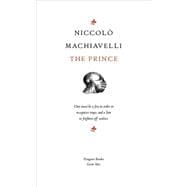
Note: Supplemental materials are not guaranteed with Rental or Used book purchases.
Purchase Benefits
What is included with this book?
Niccolò Machiavelli (1469-1527) was a Florentine statesman who was later forced out of public life. He then devoted himself to studying and writing political philosophy, history, fiction, and drama.
The New copy of this book will include any supplemental materials advertised. Please check the title of the book to determine if it should include any access cards, study guides, lab manuals, CDs, etc.
The Used, Rental and eBook copies of this book are not guaranteed to include any supplemental materials. Typically, only the book itself is included. This is true even if the title states it includes any access cards, study guides, lab manuals, CDs, etc.
All the states, all the dominions under whose authority men have lived in the past and live now have been and are either republics or principalities. Principalities are hereditary, with their prince's family long established as rulers, or they are new. The new are completely new, as was Milan to Francesco Sforza, or they are like limbs joined to the hereditary state of the prince who acquires them, as is the kingdom of Naples in relation to the king of Spain. Dominions so acquired are accustomed to be under a prince, or used to freedom; a prince wins them either with the arms of others or with his own, either by fortune or by prowess.